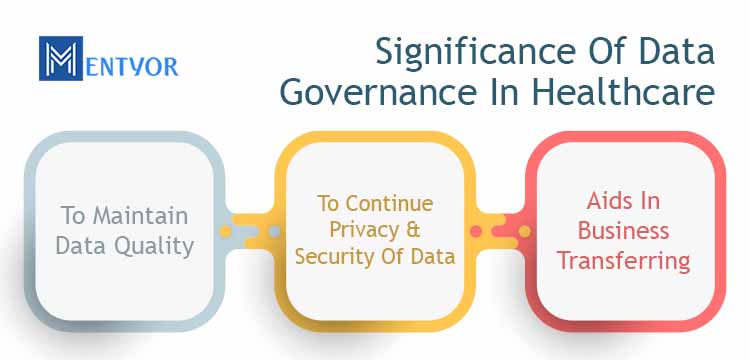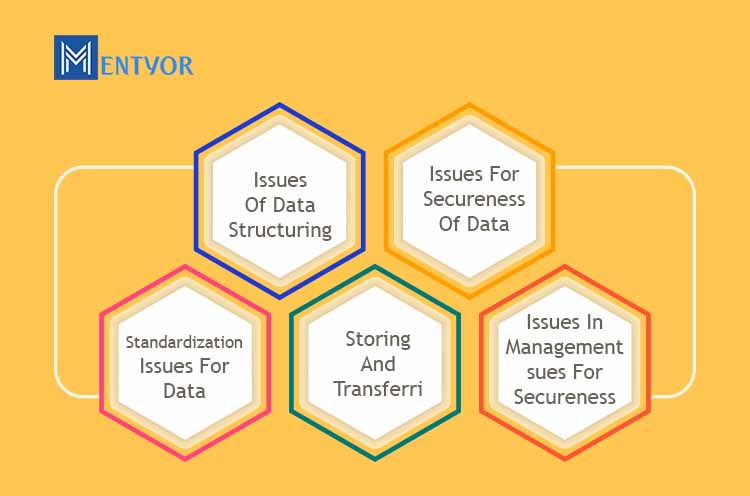Data governance has gained prominence in various fields. Right from the IT sector to the schools, data governance is in great use, mainly to handle the complex and large amount of information. Have you ever thought of how hospitals manage the reports of so many patients? Or handle the data regarding qualifications of different doctors? All this is done with assistance. Data governance in healthcare has increased to deal with various data types used at hospitals and similar institutions. The importance of data governance in healthcare is on rapid growth, especially in times of national emergency.
The use of governance in healthcare requires understanding its use and challenges. While the growth for data governance in healthcare increases, a large part is yet to know what it is. To know what it is, we must understand the role of it in the healthcare sector. Let’s understand it chronologically.
Read our blog on Data Governance Tools for 2022: 7 Best Data Governance Tools For 2022
What Is Data Governance In The Healthcare Sector?
In a crude sense, data governance refers to the control, authority, and management of data and information of a sector or organization. If applied to the healthcare sector, This acts in a similar pattern. It refers to monitoring and enforcing security for critical health information [1]. Under the rubric of data governance in hospitals and health institutions, there are policies and procedures to guide, manage, protect and govern. This is done for the complex electronic information owned by the hospital or health institutions.
For this very implication of data governance in hospitals and healthcare centers, there is a separate team devoted to it. The team of health information management (HIM) professionals looks after the operation of governance in health centers. They maintain the patient’s information integrity and continue reviewing the records for accuracy [1]. This also demands them to coordinate well with the IT sector and look after sudden risks that might occur.
A particular team of HIM professionals continues to tackle the obstructions that occur. Apart from maintaining the updates, they also devise the latest technology to improvise data governance. This has introduced them to access the relevant data governance models based on the requirements.
The importance of data governance in healthcare also maximizes opportunities. It provides various or similar healthcare institutes to collaborate and work on governance efficiently. With this, there are only the interventions by experts in data governance in healthcare. This makes it reliable that the risks will be handled well and sound by those who know about it in depth.
Significance Of Data Governance In Healthcare

The importance of data governance in healthcare has come a long way with time. Today, it is not only securing the tumultuous amount of hospital data but also enabling optimistic changes for the future.
The increasing implementation of data governance in healthcare has been outnumbering due to various reasons. Below are some of the points, explaining why it is significant in the healthcare sector.
To Maintain Data Quality
Data information is enormous in hospitals. Every day, new patients come in and old patients maintain the follow-up. This endangers the healthcare centers to keep the relevant information intact. This can gravely impact both the efficiency and effectiveness of working health centers [2]. Both the strategic and operational levels for these centers get disturbed. As the next consequence, there is a misplacement of information that might be critical to a patient or patients. With data governance programs, the healthcare centers can identify the root issue for data quality depreciation. It will also provide them with the necessary framework for the documentation of the information.
To Continue Privacy And Security Of Data
Data governance plays a significant role in managing the plethora of information in healthcare centers. It helps in maintaining both the external policies and internal procedures. It helps in maintaining the internal privacy and security of hospitals. It also aids in looking after the external data and procedures such as legislated regulations. The importance of data governance in healthcare also emphasizes accountability. With the information stored under proper administration, the risks are reduced. For instance, if there is any leakage of information, the accountable source could be identified in less time.
Aids In Business Transferring
Most of the time, hospitals are challenged to incorporate three elements, people, process, and technology. This also challenges the healthcare institutions to define the legal owner for the data. With data governance programs, hospitals can make sure to curate their plans for data ownership beforehand. Additionally, it will help them to analyze the patient’s data accurately. It will also incorporate the three elements with a balance. So that, no health care institutions have to dwindle between managing their patients, data, and strategies.
These are the points that emphasize the significance or importance of data governance in healthcare. Using this for the health sector eases out the task of recording, interpreting, and storing information. This information can be both about the number of patients or the policies and strategies of the health centers.
Read our blog on Amazing Data Science Applications: A Digital World: 12 Amazing Data Science Applications
Challenges Of Data Governance In Healthcare

Though data governance has increased its usage in healthcare centers, it is yet to be entirely prosperous. While so many healthcare centers have had a successful implementation of governance, many are struggling due to various internal or external factors.
As per the research [3], there are a total of nine themes or issues that require a proper address to implement data governance successfully. These nine themes range into different aspects of governance functionality in healthcare centers. Below is a detailed explanation of some of these nine aspects or issues that require a systematic approach.
Issues Of Data Structuring
The data structure is very essential for the entire processing of governance. The structuring lacks a proper design, user-friendly use aspect, and transparency. Also, the majority of the data structuring in healthcare centers lack natural language processing [3]. The information is inappropriately sent across the organizational lines. Overall, this affects the systematic analysis and aggregation of the data. As a result, the information would either be under-calculated or over-calculated. Also, in healthcare centers, the research and data are heterogeneous. Lack of data structure will only hamper or manipulate this heterogeneous information and may also leak in some private data.
Issues For Secureness Of Data
Privacy issues walk in automatically when there is a huge amount of heterogeneity that the healthcare centers deal with. The quest to keep in and share information is often witnessed in several health care centers. Data that is transparent and openly available to the end number of sources, comes under the red flag. There is a high possibility that the data would be misused or manipulated.
Also, with healthcare data being sensitive, it becomes vulnerable to concerns regarding its confidentiality. And, if the information is centralized, it comes under the radar of attacks. The healthcare centers need to frame out their privacy and security policies too. This is to make sure that no information is left vulnerable and a decision is made about what should stay in and go out.
Standardization Issues For Data Governance
It is observed that many healthcare centers store data in a format that is less compatible with technologies and applications [3]. This is the major cause of the lack of data standardization. As a result, it causes many complications in the transfer of data. It also raises problems regarding data acquisition and cleansing. Further, it becomes very difficult for healthcare centers to analyze and make their data available for global sharing. Lack of standardization also indicates language barriers. If the healthcare centers have no framed technical terminologies, it indirectly hampers the data standardization too. This is why, in applying data governance, it is essential to have the framework ready beforehand.
Storing And Transferring Complications
The prominent reason for the decrease in maintenance and transfers for data is the high costs for it. With the costs comes the high requirement for data analysis, which again poses a challenge. Apart from this, the security policies are only limited to securing, analyzing, and structuring patient-related data. However, experts say that the data governance policies should also be stretched for fee remittance and the yearly expenditures of the healthcare facilities.
Issues In Management

It should be named as a priority in the lists for any healthcare organization. Also, it should be a primary asset for the healthcare centers. Most healthcare institutions lack a proper management sector only. There should be an acceleration in building a proper team that looks after the implementation of data governance in healthcare, hospitals and healthcare centers. This will ensure that the access to data is in a uniform and particular control by specific entities only.
These are the challenges seen in data governance applications in healthcare centers. Both the government and private authorities must ensure that data is used and protected appropriately.
Know Difference between Data Science and Data Analytics: Difference Between Data Science And Data Analytics: A Complete Breakdown
Parting Note
Data governance in healthcare centers has been growing. The main increase for this is the amount of data in healthcare institutions. The importance of data governance in healthcare is increasing due to various needs. This includes the need of maintaining data quality, privacy policies, and business transfers.
Apart from this, the implementation of data governance in healthcare poses many challenges. These challenges require an appropriate approach to make sure that it works for healthcare institutions. These challenges range in various fields. It includes data quality issues, standardization issues, and storage issues. Apart from this, it also includes data transferring and management issues.
Common FAQs
What is data governance?
It refers to the policies and procedures regarding data maintenance, analysis, and storage. It is used in various fields, ranging from IT hubs to the educational fields.
What are the 3 elements?
The three elements include
- Policies and procedures
- People
- Technology.
References
[1] Reeves, M. G., & Bowen, R. (2013). Developing a data governance model in health care: although the term may be unfamiliar, data governance is a longstanding obligation of the healthcare industry. Healthcare Financial Management, 67(2), 82-87.
[2] Alofaysan, S., Alhaqbani, B., Alseghayyir, R., & Omar, M. (2014, March). The significance of data governance in healthcare. In Proceedings of the International Joint Conference on Biomedical Engineering Systems and Technologies (Vol. 5, pp. 178-187).
[3] Kruse, C. S., Goswamy, R., Raval, Y. J., & Marawi, S. (2016). Challenges and opportunities of big data in health care: a systematic review. JMIR medical informatics, 4(4), e5359.


 WhatsApp
WhatsApp